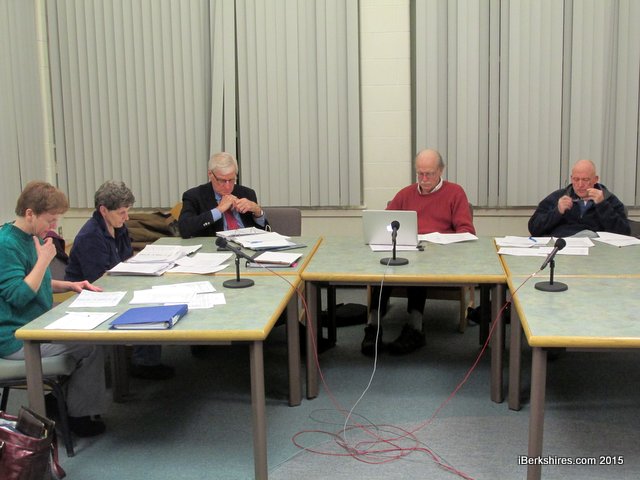Lanesborough Elementary Cutting SPED Posts In Wake Of Audit
 The School Committee received both the audit and a proposed budget this week. The School Committee received both the audit and a proposed budget this week. |
LANESBOROUGH, Mass. — The administration is calling for the elimination of about seven positions in the school's special education department.
The request comes on the heels of an audit that found ineligible students were being enrolled in special education programming, resulting in double the amount of staff needed.
"We felt we were overstaffed in certain areas and it needed to be corrected," said interim Superintendent Gordon Noseworthy on Thursday when he presented the first draft of the budget to the School Committee.
"I feel this is a correction."
Noseworthy said the reductions do not go as far as the recent audit suggests but does ensure students are properly served.
The proposed budget calls for special education salaries cutbacks of some $160,000, comprising about five aides, a speech therapist and a teacher.
It is unclear, however, if those jobs are part time or full time or what the full-time equivalent, or FTE, reduction will be.
"We worked long and hard to justify this recommendation," Noseworthy said. "We are still capable of servicing the children according to their plans."
The suggestion is supported by a 24-page audit the School Committee commissioned in October for $3,000 through Futures Education, a consulting and educational studies firm with offices in Springfield. Noseworthy received a draft form months ago and the School Committee received the final draft on Wednesday. The audit can be
found below.
Using an availability ratio index (ARI) to compare the staffing levels to other districts, the audit suggests staffing levels in the department are double the amount needed.
The school had five special education teachers for 47 students, the audit shows, creating a 7:1 student/teacher ratio. Futures Education recommends the ratio should be closer to 15:1. The school employed 15 paraprofessionals when it needed eight; and a 1.6 FTE speech therapist was employed when it needed one half-time. Times for an occupational therapy position and school psychologist were also well above recommendations.
"The ARI for the K-6 special education staff is 8.8:1, which is 41 percent more highly staffed than the expected ARI of 15:1," the report reads.
The audit went on to read "the ARI for paraprofessionals of 3:1 represents more than twice the most generously staffed district in Massachusetts the authors have analyzed."
Further, the special education population has grown 51 percent in the last decade and 23 percent in the last five years, numbers the auditors found "astounding." The audit suggests developing a new way to determine the need for individual educational programs because many of those with special education programming showed no evidence of needing it.
"There were many instances in which achievement scores did not substantiate the need for academic services," the report reads. "In many circumstances, these findings revealed solidly average skills. In other instances, the IEPs were devoid of any achievement results, and thus did not adequately support stated academic needs."
The auditors urge the school to "restructure the special education policy and procedure handbook to refine eligibility criteria with an emphasis on what constitutes a true disability vs. a weakness."
The audit suggests there is too much of a divide between general education and special education departments. And the staff's relationship with the community is strained.
Parents don't understand the educational models, it reads, and school officials need to do a better job working with parents. Special education is a "last resort" and not the first step.
"There was reported to be a high degree of understanding on the part of staff and parents with respect to the concepts of free appropriate public education and least restrictive environment. This reflects the hard work, knowledge, and dedication among all IEP stakeholders to ensure parents are partners," the audit reads.
"However, per report, there is a small, yet vocal, cadre of parents that expect special education services to go beyond appropriate. Perhaps in corroboration of the reality of this vocal minority, staff members reported that 'the squeaky wheel may get the grease' in reference to receiving more IEP-asociated services than those who do not."
School Committee member Robert Barton called the audit "devastating criticism of the leadership."
"We all have a sense that there has been overstaffing in that area," Barton said. "We are making a hard change here."
Futures Education Audit
Tags: audit, budget cuts, LES, special education,
 The School Committee received both the audit and a proposed budget this week.
The School Committee received both the audit and a proposed budget this week. The School Committee received both the audit and a proposed budget this week.
The School Committee received both the audit and a proposed budget this week.